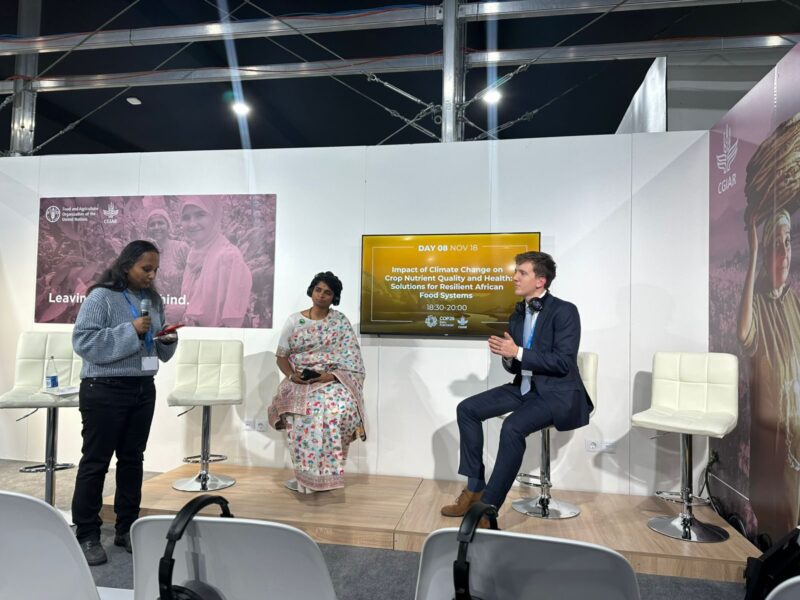Nutrition Lead at AGRA Bertha Mkandawire says Africa needs scalable solutions to deal with malnutrition on the continent.
Scalable solutions in agriculture are innovations or technologies that can be effectively and easily expanded and adapted to increase productivity, efficiency, and sustainability across varying farm sizes and conditions.
She says about 52% of the population on the continent cannot afford a healthy diet and only 6 African countries are likely to meet targets set by governments to improve nutrition by 2025.
She is urging the global community to support ongoing works on the continent to improve nutrition.
“Let’s advance more scalable solutions. What Africa needs now are solutions that are scalable to address the stunting rates that are still quite very high among many African countries,” Mkandawire said.
Speaking at a side event at the ongoing 29th United Nations Climate Change Conference (COP29) in Baku, Azerbaijan, she said due to the importance of nutrition, it has become a big part of AGRA’s work and they are open to working with partners to roll out a nutrition strategy across the continent.
“We realized that on the African continent, many people depend on primary staples; maize, wheat, and rice, as their primary source of calories.
"These crops are facing low productivity because of climate change, and that becomes a very big challenge,” she said.
“We at AGRA are emphasising soil health because improved soil leads to improved nutrients in the crops we are growing,” she added.

The side event was on the topic; “Impact of Climate Change on Crop Nutrient Quality and Health: Solutions for Resilient African Food Systems.”
It explored the impact of climate change, particularly rising atmospheric carbon dioxide and extreme weather events, on food supply and the nutrient quality of key staple crops.
It highlighted how these challenges heighten malnutrition risks, especially in vulnerable populations, and discussed innovative technologies and resilient food production systems to safeguard food security and improve nutritional outcomes.
Vice President of Global Programs at Farm Journal Foundation Rose Barbuto observed over 3 billion people cannot afford a healthy diet across the world.
She said poor diet is responsible for one-fifth of the mortality rate in the world but higher in low-income countries.
Between 76 to 85% of the population in the developing world cannot afford healthy balanced diets, a situation she said climate change was partly responsible for.
“Beyond traditional yield measures, increased carbon in the atmosphere contributes to the reduction of protein and minerals in plants while increasing the production of sugars and starches due to changing balances in nitrogen and phosphorous levels.
"Elevated carbon dioxide has been shown to decrease protein concentrations in wheat, barley, rice, and potato by 10 to 15%,” she disclosed.
Oliver Camp, Environment and Food Systems Advocacy Advisor of the Global Alliance for Improved Nutrition (GAIN) observed climate change is making micronutrients, in particular, less available to the populace.
“We know that when there is a higher concentration of carbon dioxide in the atmosphere, you see a reduction in really critical micronutrients in crops. You see a reduction in iron and zinc in wheat.
"So, if you're getting 70% of your calories from wheat and then that is having its nutrient content reduced, then you can see how that will affect nutrient outcomes,” he said.
Praveena Sridhar, Chief Science and Technology Officer of the Save Soil movement called for practices that will help replenish soil nutrition.
She urged farmers to practice no-till, intercropping, and sustainable soil management practices or regenerative agriculture.
Latest Stories
-
Zambia Emoluments Commission understudies Ghana’s FWSC
11 mins -
Rebecca Tweneboah Darko: Are men really the prize when it comes to relationships?
12 mins -
We just want to sit and review our working conditions – TEWU
18 mins -
Flower Pot Interchange: Explain how a GH¢69m project shot up to GH¢700m – Minority to gov’t
22 mins -
Most of my players are amateurs – Niger coach Badou Zaki discloses after win against Ghana
25 mins -
The Samira Bawumia Literature Prize: A critical vehicle for reviving writing, literature and nurturing talents
34 mins -
Embrace home gardening for sustainable food security
39 mins -
Seminar on ‘The Image of Africa in Hollywood Films’ inspires insightful discourse at UniMAC
43 mins -
Road fatalities in Kumasi decrease by 37% – Report
45 mins -
Public University lecturers campaign for John Mahama in Ho
52 mins -
How to (Not) govern an African country to the next election
55 mins -
Five clues from Man Utd video of first training under Amorim
57 mins -
MUSIGA empowers musicians with digital tools
58 mins -
CODEO cites abuse of incumbency ahead of 2024 election
1 hour -
Workshop to boost biosecurity practices in Ghana’s livestock and aquaculture sectors held
1 hour

